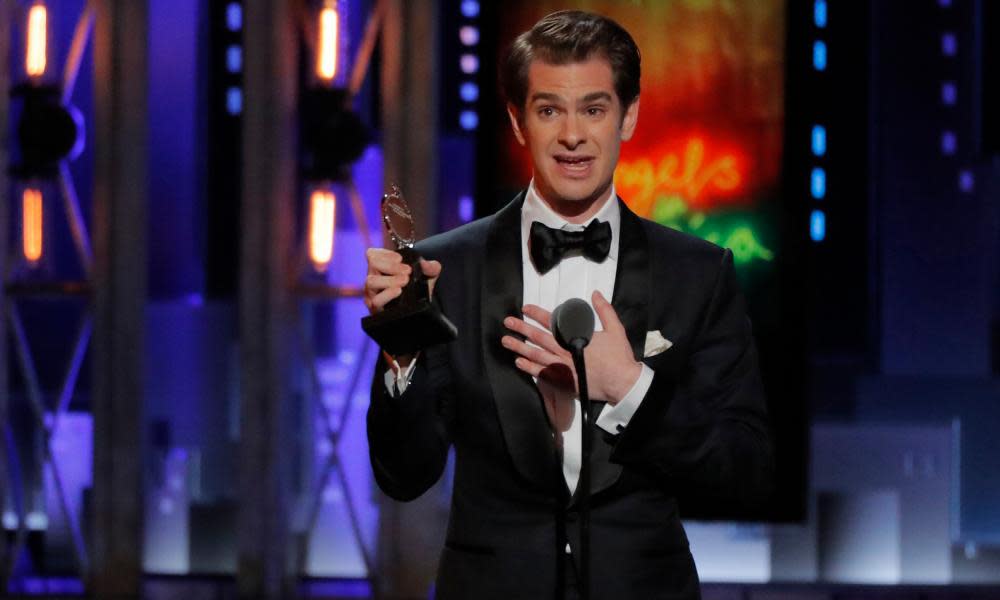A rallying cry for acceptance: how the Tony awards brought the house down

Has it really only been a year since Kevin Spacey took the stage of the Beacon Theater making jokes about closets and beards and Hillary’s emails? Well, time flies when you’re trying to satisfy art, commerce and Nielsen ratings. Last night’s Tony awards, relocated to Radio City Music Hall, were a kinder, humbler, and more satisfying affair, often rewarding local heroes over big names and big box office, reasserting Broadway as a community rather than just a loose assortment of sequins.
The evening’s most poignant moment didn’t include any stars at all. It was a surprise performance by the Marjory Stoneman Douglas drama club, survivors of the February shooting, singing Seasons of Love. Even the imperious Glenda Jackson loved it. So that’s how you measure, measure a year.
The singer-songwriters Josh Groban and Sara Bareilles, neither of them accused of multiple counts of sexual assault, seemed to be operating from a place of affectionate humility. They showed photos of themselves as theater kids and dedicated their bouncy, dual-piano opening number, co-written with Shaina Taub, to “the people who lose / Both of us have been in your shoes / This one’s for the loser inside of you.” The message was audibly one of inclusion, which they maintained throughout, barring a brief number in which they appeared in matching gold lamé jumpsuits and complained about Broadway’s eight-days-a-week schedule.
The acceptance speeches were unabashedly political. So were some of the introductions. Amy Schumer, introducing My Fair Lady, a nominee for best revival of a musical, said that the show “highlights equal rights for women. Because we actually don’t have that.” She also called Henry Higgins a mansplainer. Genius. And Robert De Niro, introducing a lugubrious spoken-word fizzle by Bruce Springsteen, entered saying: “Fuck Trump. It’s no longer down with Trump. It’s just fuck Trump.” Most of which was bleeped for air.
Elsewhere, winners emphasized acceptance and inclusivity. Lindsay Mendez, a winner for Carousel, spoke of Broadway as a place to be her true self and Ari’el Stachel, a winner for The Band’s Visit, said that after 9/11 he never thought he would be allowed to portray his own race. “I want every kid who might be watching to know that your biggest obstacle may turn into your purpose,” he said.
Andrew Garfield, a winner for actor in a leading role, dedicated his award to the LGBT community and suggested, “Let’s all bake a cake for everyone who wants a cake to be baked.” David Cromer, who directed The Band’s Visit, hoped that those in pain would reach out for help, and Jackson told the crowd that they had been “welcoming and kind, and generous. And America has never needed that more,” Then she ceded the stage to the reindeer from Frozen.
Still, not every speech was a rallying cry. Chita Rivera, the recipient of a lifetime achievement Tony, teased “There’s still a lot of salt left in this shaker” and John Tiffany, Harry Potter’s director, spent his time at the podium asking the crowd to sing happy birthday to his boyfriend.
Most of the season’s high-profile shows, like Mean Girls and Frozen and SpongeBob Squarepants, were shut out, though SpongeBob did take home a design award for its antic, extravagant set. But anyone getting ready to step on a high horse about branded entertainment had to step right off as Harry Potter and the Cursed Child picked up six awards, including best play. Though Angels in America and Three Tall Women divvied up the acting awards, Harry Potter offered a master class in how even a work associated with a name brand could be reimagined as a thrilling and ambitious theatrical event.

The evening’s biggest winner was The Band’s Visit. Like Mean Girls and Frozen, it’s another movie adaptation, though not one that’s attracted the same nothing-new-under-the-spotlight complaints. Its sweep suggests a preference for intimacy over glitz, musical sophistication over power pop. The Band’s Visit also offered the evening’s best production number, which saw an awesomely sultry Katrina Lenk beguiling the crowd as Tony Shalhoub looked on.
Harry Potter and The Band’s Visit are in different ways unlikely winners. Harry Potter is doing great box office, though its size and ambition will make touring difficult. The Band’s Visit tours more easily, but it’s been struggling at the box office and doesn’t go in for the Broadway razzle-dazzle. While the competition wasn’t especially strong, neither is a weak choice or a cynical one.
Though these shows may seem dissimilar – and they are – they are also clear reflections of the evening’s themes of inclusivity and generosity. Each piece is about characters who feel isolated and apart, stranded out of place and out of time, locked away from love. And each script imagines that if we can only talk to each other and listen to each other and love one another, this can be remedied. These are fantasies, but they are fantasies that America and its Tony voters need right now.
It’s a fantasy that theater has always dangled – that if we can just come into the same room together and breathe the same air together, then we can learn from each other. It’s a nice idea, but maybe also a specious one. (Who really believes that Mike Pence’s life was meaningfully changed by Hamilton?) But this year’s ceremony invited its audience to believe that this kind of a community is possible. As Bareilles said as she prepared to sing the final number: “We know the world can be a scary place and more than ever we need each other.”


